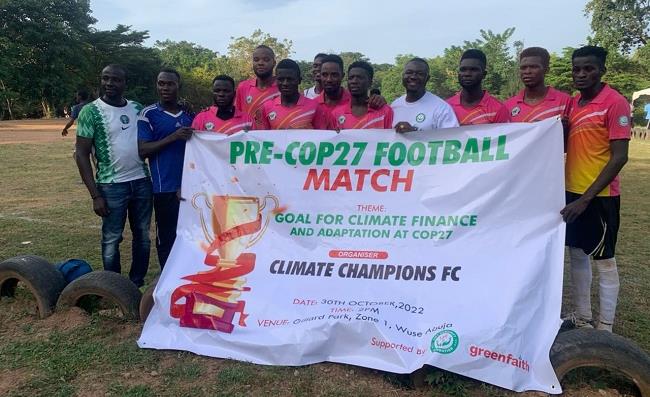Climate Change Football Club (CC FC) and Lift Humanity Foundation (LHF), in collaboration with Greenfaith, have demanded that the ecological challenges bedeviling African countries should be given the required attention during the 27th Session of the Conference of the Parties (COP27) to the United Nations Framework Convention on Climate Change (UNFCCC) that is starting November 6, in Sharm El-Sheikh, Egypt.

The advocates wish for more affected and oppressed people across the continent to be included in the global conversation to properly capture their voices and estimate the cost of climate change on their peaceful co-existence.
As part of efforts to spur action on some of these demands, the group organised a football match on Sunday, October 30, 2022, in Abuja, to sensitise the public on the dangers of climate change and how to mitigate and adapt to them.
With its objective on the “Goal for Climate Finance and Adaptation at COP27,” the groups are demanding that the issue of loss and damage be urgently addressed, because Africa’s contribution to the global emissions crisis is infinitesimal, yet it is the most affected by the catastrophic nature of unpredictable changes in the weather pattern.
“So, COP27 must respond to the realities and priorities of Africa’s needs,” says Etta Michael Bisong, the Founder of Climate Champions FC.
For everyone to be carried along, Bisong said women, youths, civil society organisations (CSOs), people from Small Island States, indigenous, as well as people with disabilities must be given access to participate and make contributions during the epic climate dialogue.
Citing the objective of Sustainable Development Goal (SDG) 13, which advocates for the promotion of climate action, he hinted that football, which is his organisation’s core mandate, can help mobilise and ignite this expected response.
“We believe that aligning our goal with Lift Humanity Foundation will not only help accelerate our message, but it will also galvanise and ensure the needed support to spark up public action on climate change,” the CC FC chief said.
Similarly, the Executive Secretary of LHF, Mr. Pius Oko, also believes that it is ecologically ill-logical and unfair for Africa to continue to suffer and pay for a problem that is openly known to be created by the industrialised countries.
To correct this anomaly, Oko, who is also the representative of Greenfaith, urged that COP27 must concentrate on climate justice by seeking ways to deal with the problem of loss and damage, as well as increase access to finance as the single but most effective solution to bridge the existing environmental gaps that are causing the planet to warm.
He referenced the recent flood that consumed over 30 states in Nigeria, claimed more than 600 lives, and displaced millions of citizens from their original habitat as a clear example of the price that “our people have to pay for a problem caused by others”.
Considering the alarm raised by the Intergovernmental Panel on Climate Change (IPCC) warning the world about the possibility of exceeding the 1.5-degree Celsius benchmark, the climate justice campaigner sees this year’s conference as another unique opportunity for African nations to restructure the climate change narrative to reflect their most critical needs.
Therefore, he advised that COP27 should focus on the solutions that are embedded within Africa’s traditions and indigenous knowledge.
“Africa should aim to close the widening North-South divisions and the stalling progress in climate action, especially the urgent strengthening and implementation of the Nationally Determined Contributions (NDCs),” he said.
For COP27 to deliver its expected outcome, according to him, it must move from rhetoric to demonstrable action and ensure that the 50:50 split target between mitigation and adaptation finance is met.
He added that an ambitious plan on how to raise $100 billion per year in grant equivalent funding from developed countries is very essential to meet the new 2025 target.
Furthermore, the LHF helmsman is seeking an urgent increment of the amount allocated to affected communities and the removal of all the barriers that are preventing access to climate finance.
“Consequently, COP27 in Sharm El-Sheikh should be the elevation of loss and damage as a stand-alone pillar in the UNFCCC negotiation,” Oko appealed.
